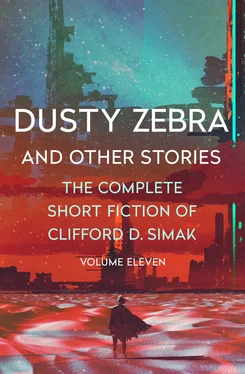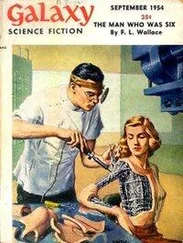“You will want to choose a dream,” said the spokesman of the robots. “We can show you many samples. We can blend them to your taste. We can—”
“Thank you,” said Webster. “I do not want a dream.” The robot nodded, understanding. “I see, sir. You only want to wait, to pass away the time.”
“Yes,” said Webster. “I guess you’d call it that.”
“For about how long?”
“How long?”
“Yes. How long do you want to wait?”
“Oh, I see,” said Webster. “How about forever?”
“Forever!”
“Forever is the word, I think,” said Webster. “I might have said eternity, but it doesn’t make much difference. There is no use of quibbling over two words that mean about the same.”
“Yes, sir,” said the robot.
No use of quibbling. No, of course, there wasn’t. For he couldn’t take the chance. He could have said a thousand years, but then he might have relented and gone down and flipped the switch.
And that was the one thing that must not happen. The dogs had to have their chance. Had to be left unhampered to try for success where the human race had failed. And so long as there was a human element they would not have that chance. For man would take over, would step in and spoil things, would laugh at the cobblies that talked behind a wall, would object to the taming and civilizing of the wild things of the earth.
A new pattern—a new way of thought and life—a new approach to the age-old social problem. And it must not be tainted by the stale breath of man’s thinking.
The dogs would sit around at night when the work was done and they would talk of man. They would spin the old, old story and tell the old, old tales and man would be a god.
And it was better that way.
For a god can do no wrong.
Of the five stories of World War II air combat that Clifford D. Simak wrote during the war era, this was the fourth—and the first to be written after the United States entered that war. And whereas the earlier ones all took place in the European theater, this one, as well as the one that followed, featured Americans in action against the Japanese. This story was sent to American Eagle in October 1942 (following a hiatus caused at least in part by Cliff’s short-lived job with an American intelligence organization), but it would first appear in a magazine called Air War , in fall 1943.
The issue had a ten-cent cover price, and it was a good deal thinner than most pulp magazines, most likely the result of wartime paper shortages, but the issue carried reassuring notices that although changes in the customary typography and layout made the magazine look smaller, it had the normal content.
—dww
Mason saw the Zeroes first and spoke to Foster through the phones.
“Three rat cages high up, Steve. Getting ready to gang us.”
The pilot craned his neck and looked, finally spotted the dots far overhead.
“O.K.,” he said. “Let them think we haven’t seen them. They’ll come sliding in for a kill. We’ll nail them then.”
Mason hunkered down behind his gun and waited, watching the planes with eyes narrowed against the setting sun. Up ahead, Foster drove the throbbing Avenger along its serene way. Off to the right was the shoreline of Guadalcanal, a mass of jungle green, with a strip of white sand between the green and the darkening blue of the ocean.
“The Old Man has the right hunch, all right,” Foster said quietly. “Those yellow rats have a hidden base somewhere on the island. Otherwise those planes of theirs couldn’t make such quick appearances and then disappear as completely as they do. Those babies up there probably are from that very field.”
Mason wasn’t too interested in conversation. The Zeroes were edging in closer.
One of them slid off in a knifelike power dive.
“Here they come,” yelped Mason, getting braced.
For what seemed an eternity, Foster held the Avenger on course. The second Zero was diving now and the third was wheeling over. Mason huddled grimly, waiting. He knew the Avenger wouldn’t keep sailing along like this until Jap slugs reached out for it.
Any minute now …
Suddenly the Avenger came to life, snapped skyward, stood on its tail and climbed, the Wright Cyclone shrieking a challenge to the diving enemy.
The leading Zero twisted desperately to follow the American plane, skidding a sharp angle that almost tore it apart. Calmly Mason lined his sights with the pool of light that was the Jap’s propeller as the plane came about, pressed the trips.
Fifty calibre slugs slammed into that pool of whirling steel and the Zero came unstuck.
The wash of light disappeared in an explosion of shattered metal. Long strips peeled off the cowling and the plexiglass that housed the pilot disappeared in shreds of flying debris that glinted in the sun.
For a split second something was punching holes along the Avenger’s left wing as the second Zero flashed past, guns still smoking.
Then the wing guns of the Grumman opened up and Mason flipped his turret around.
The Avenger still was climbing and the wing guns were stabbing out at the third Jap, storming straight down upon them.
The red mouths of the Zero’s guns flickered at them wickedly and the Avenger shuddered slightly as bullets struck home.
Ducking, Mason got behind his sights and swung his guns to bear, but even as he did, there was a thudding wham, the Grumman bucked to the recoil of the cannon in its nose and then rolled over, tumbling out of the Zero’s way.
The Jap ship shook for a moment in the sky, seemed to stall in its downward dive, then slowly fell apart. One wing came off and tumbled seaward. The plane sideslipped and started screaming down, whirling and twisting, heaving wreckage as it fell, part of the second wing, the tail assembly, the motor, wrenched from the mountings, falling free.
But Mason did not watch it. There was other business at hand.
“Where is the other one?” he yelled at Foster.
Apparently Foster didn’t know, for there was no answer.
There was not long to wonder.
Mason straightened up to sweep the sky and a moment later a hurricane of slashing, ripping steel caught the American ship—just a brief two second burst, but one that slivered chunks of metal off the wings, that shattered the plexiglass, that punched the tail full of gaping holes.
The Jap had attacked from below, even now was swinging up on the side of them, motor full out to make his getaway.
Mason whipped the guns around, got set as the Jap climbed into view. It was sheer luck, of course, that the Zero happened to climb straight into his sights.
Mason took advantage of that luck. He pressed the trips and kept them down.
The 50 calibres raked the rat cage from prop to tail, chewed it into a sieve-like hulk.
It went on climbing for a moment, faltered, wobbled for a second, then slid in a long slanting dive down toward the water.
Mason rubbed his hands gleefully.
“Well, that’s that,” he announced, but even before the words were out of his mouth he knew something was wrong. Something wrong with the throbbing of the Cyclone. As if the motor had the hiccoughs.
“Steve,” he yelled. “Steve! Are you all right?”
“I’m all right,” said Foster, “but the motor isn’t. Acts like it can’t get gas.”
“Feed-line,” suggested Mason.
“Yeah,” agreed Foster. “That last monkey must have messed us up a bit.”
“Nothing,” said Mason, “like we messed him up.”
Foster was craning his head over the side, trying to figure something out. The motor was choking and gasping.
“How does that beach down there look to you?” asked Foster.
Читать дальше












